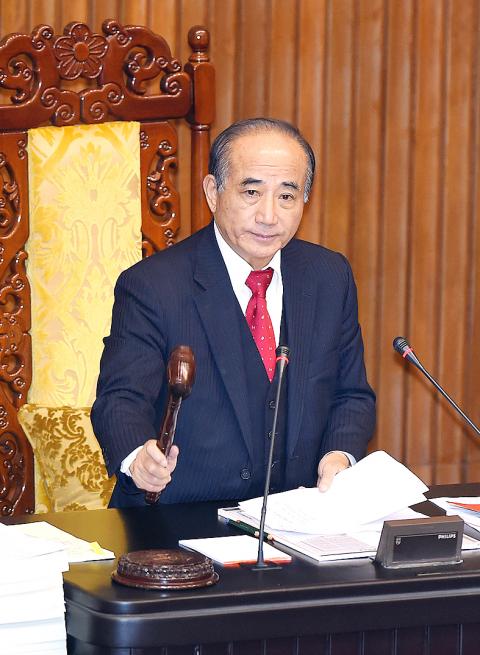The legislature passed an amendment to the Civil Servants Election and Recall Act (公職人員選舉罷免法) yesterday that lowered the threshold for the percentage of the vote political parties need to garner to receive government subsidies.
The threshold for government subsidies for parties’ campaign funding has been lowered from 5 percent to 3.5 percent of the votes a political party garners for legislators-at-large and overseas legislators, in the next legislative election.
“The subsidy ... shall be granted to the political party at a rate of NT$50 per vote every year” until the next legislative election, the amended act states.

Photo: Liao Chen-hui, Taipei Times
The amendment was proposed by the Taiwan Solidarity Union (TSU), who had earlier called for much lower thresholds of 1 percent or 3 percent, but compromised at 3.5 percent after encountering unyielding resistance from the Chinese Nationalist Party (KMT).
According to the statistical information provided by the Central Election Committee, the KMT, the Democratic Progressive Party (DPP), the TSU and the People First Party are the only four parties — with 44.55 percent, 34.62 percent, 8.96 percent and 5.49 percent of the vote obtained respectively — to have received subsidies following the 2012 legislative election.
With the lowering of the threshold, the Green Party and the New Party, which received 1.74 percent and 1.49 percent of the vote in 2012 respectively, would still not be subsidized if their percentage of the vote remains the same in the next legislative election.
“While the TSU did receive the subsidy, we believe that the lowering of the threshold is crucial for the survival and the participation of smaller political parties, which are mostly public-benefit-oriented,” TSU Legislator Lai Chen-chang (賴振昌) said. “It is a major step forward in the move toward more pluralistic politics.”

Taiwan is projected to lose a working-age population of about 6.67 million people in two waves of retirement in the coming years, as the nation confronts accelerating demographic decline and a shortage of younger workers to take their place, the Ministry of the Interior said. Taiwan experienced its largest baby boom between 1958 and 1966, when the population grew by 3.78 million, followed by a second surge of 2.89 million between 1976 and 1982, ministry data showed. In 2023, the first of those baby boom generations — those born in the late 1950s and early 1960s — began to enter retirement, triggering

ECONOMIC BOOST: Should the more than 23 million people eligible for the NT$10,000 handouts spend them the same way as in 2023, GDP could rise 0.5 percent, an official said Universal cash handouts of NT$10,000 (US$330) are to be disbursed late next month at the earliest — including to permanent residents and foreign residents married to Taiwanese — pending legislative approval, the Ministry of Finance said yesterday. The Executive Yuan yesterday approved the Special Act for Strengthening Economic, Social and National Security Resilience in Response to International Circumstances (因應國際情勢強化經濟社會及民生國安韌性特別條例). The NT$550 billion special budget includes NT$236 billion for the cash handouts, plus an additional NT$20 billion set aside as reserve funds, expected to be used to support industries. Handouts might begin one month after the bill is promulgated and would be completed within

NO CHANGE: The TRA makes clear that the US does not consider the status of Taiwan to have been determined by WWII-era documents, a former AIT deputy director said The American Institute in Taiwan’s (AIT) comments that World War-II era documents do not determine Taiwan’s political status accurately conveyed the US’ stance, the US Department of State said. An AIT spokesperson on Saturday said that a Chinese official mischaracterized World War II-era documents as stating that Taiwan was ceded to the China. The remarks from the US’ de facto embassy in Taiwan drew criticism from the Ma Ying-jeou Foundation, whose director said the comments put Taiwan in danger. The Chinese-language United Daily News yesterday reported that a US State Department spokesperson confirmed the AIT’s position. They added that the US would continue to

One of two tropical depressions that formed off Taiwan yesterday morning could turn into a moderate typhoon by the weekend, the Central Weather Administration (CWA) said yesterday. Tropical Depression No. 21 formed at 8am about 1,850km off the southeast coast, CWA forecaster Lee Meng-hsuan (李孟軒) said. The weather system is expected to move northwest as it builds momentum, possibly intensifying this weekend into a typhoon, which would be called Mitag, Lee said. The radius of the storm is expected to reach almost 200km, she said. It is forecast to approach the southeast of Taiwan on Monday next week and pass through the Bashi Channel